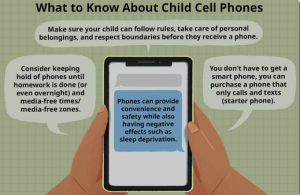The question of whether children should use smartphones in their everyday life is a topic of ongoing debate. There are both advantages and disadvantages associated with children using smartphones, and the decision should be based on various factors, including age, maturity, and parental supervision. Here are some considerations:

Should Children use Smartphones in their Everyday Life?
Table of Contents
ToggleAdvantages of Children Using Smartphones:
- Educational Apps:
- Smartphones can provide access to educational apps and content that can enhance learning and development in areas such as language skills, mathematics, and critical thinking.
- Communication:
- Smartphones enable children to communicate with family and friends, fostering social connections and relationships. Video calls and messaging apps can help bridge distances.
- Entertainment and Creativity:
- Age-appropriate games, apps, and creative tools on smartphones can provide entertainment and stimulate creativity. Educational games can make learning enjoyable for children.
- Safety and Emergency Situations:
- Having a smartphone allows children to quickly reach out to parents or guardians in case of emergency situations. It can also serve as a locator device with built-in GPS for added safety.
- Digital Literacy:
- Exposure to smartphones can contribute to the development of digital literacy skills, which are increasingly important in today’s technology-driven world.
Disadvantages and Concerns:
- Screen Time and Health:
- Excessive screen time, especially at a young age, can have negative effects on children’s physical and mental health, including sleep disturbances, eye strain, and sedentary behavior.
- Online Safety and Content:
- Children may be exposed to inappropriate content or encounter online safety risks. Parental controls and supervision are crucial to mitigate these risks.
- Social Development:
- Excessive use of smartphones can potentially impact face-to-face social interactions and hinder the development of crucial social skills in children.
- Addiction and Distraction:
- Children may become addicted to smartphones, leading to issues such as difficulty focusing on schoolwork, disrupted sleep patterns, and a lack of engagement in offline activities.
- Privacy Concerns:
- Children may not fully understand the implications of sharing personal information online. There are privacy concerns related to social media use and interactions with strangers.
- Cyberbullying:
- Smartphones can expose children to the risk of cyberbullying. Parents need to be vigilant about their children’s online interactions and provide guidance on responsible digital behavior.
- Developmental Impact:
- There are concerns about the potential impact of prolonged screen time on children’s cognitive and emotional development. It’s important to strike a balance with other activities.
Guidelines for Parents:
- Set Age-Appropriate Limits:
- Consider age-appropriate guidelines for smartphone use and screen time. Younger children may benefit from limited and supervised access.
- Use Parental Controls:
- Activate parental controls on smartphones to filter content and restrict access to inappropriate apps or websites.
- Educate on Online Safety:
- Teach children about online safety, including the importance of not sharing personal information, being cautious about online interactions, and reporting any uncomfortable situations.
- Encourage Offline Activities:
- Encourage a balance between screen time and offline activities, such as outdoor play, reading, and creative pursuits.
- Model Healthy Behavior:
- Model healthy smartphone use by demonstrating responsible screen time habits and engaging in face-to-face interactions.
- Establish Screen-Free Zones:
- Designate certain areas or times in the home as screen-free zones to promote family interaction and reduce dependence on smartphones.
- Monitor Apps and Content:
- Regularly check the apps and content that children are accessing on their smartphones to ensure they are age-appropriate and aligned with family values.
- Encourage Open Communication:
- Create an open and non-judgmental environment for children to discuss their online experiences, concerns, and questions.
Ultimately, the decision about whether children should use smartphones in their everyday lives depends on careful consideration of the child’s age, maturity, and the specific use cases. It’s important for parents to actively engage with their children, set clear guidelines, and stay informed about the apps and content their children are accessing.
